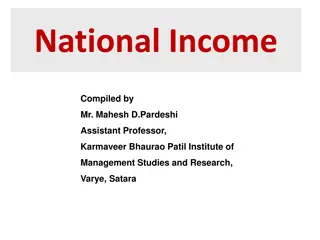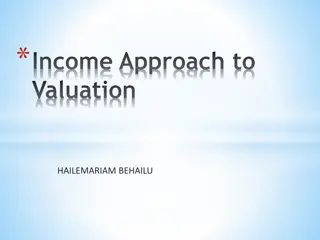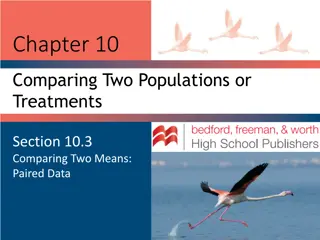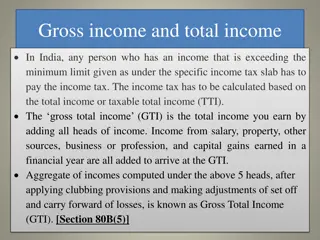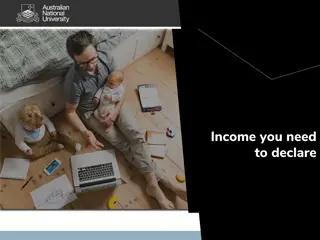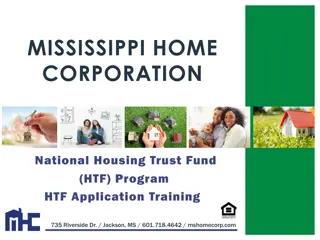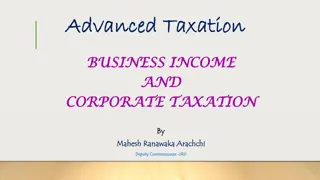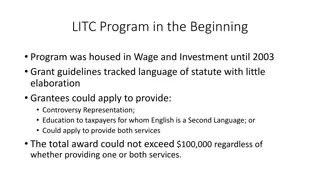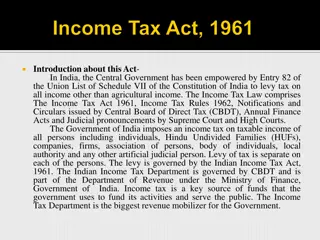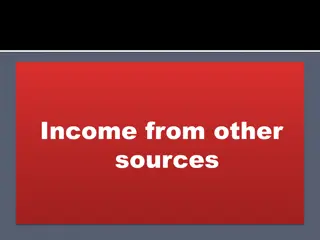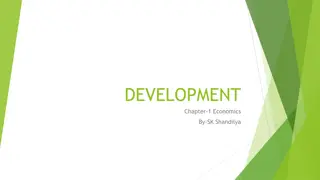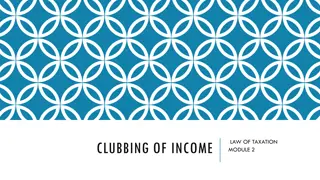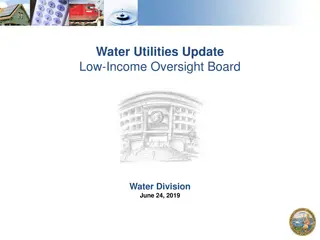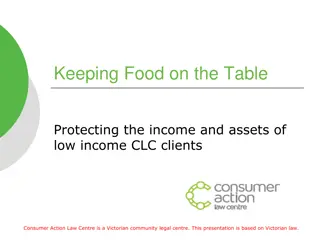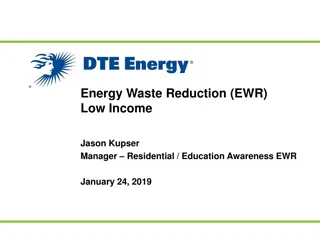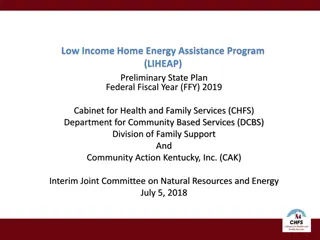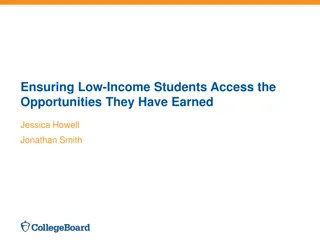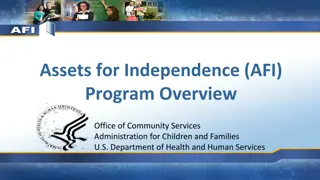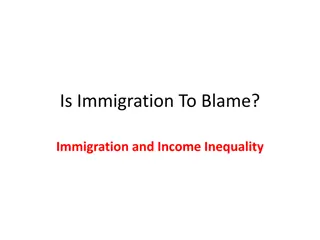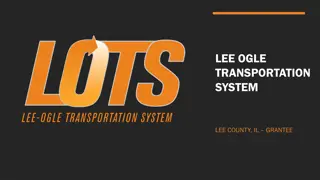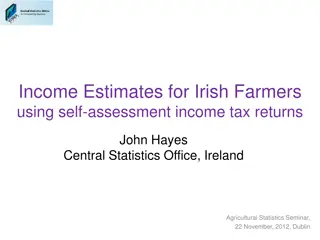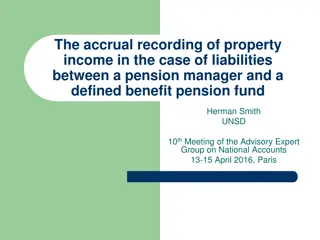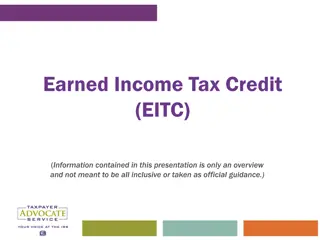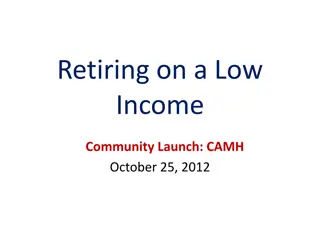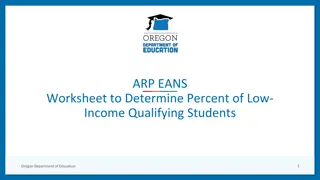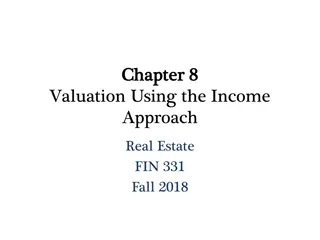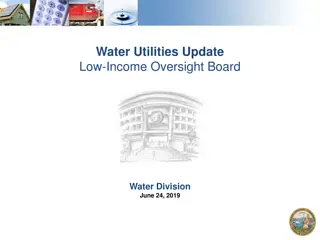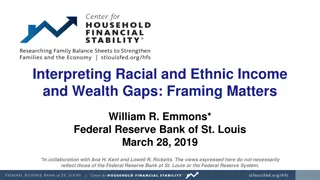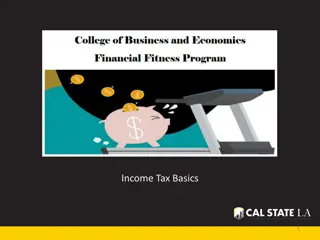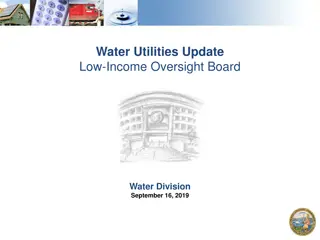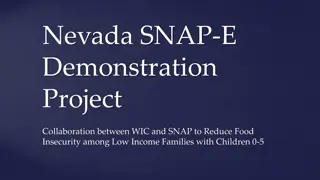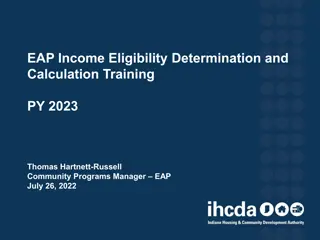Understanding Concepts of National Income in Economics
Explore the concepts of national income presented by Dr. Rashmi Pandey, covering key indicators such as Gross National Product (GNP), Gross Domestic Product (GDP), Net National Product (NNP), Net Domestic Product (NDP), Personal Income, Disposable Income, Per Capita Income, and Real Income. Gain ins
0 views • 22 slides
Understanding National Income and Its Importance in Economics
National income is a crucial measure of the value of goods and services produced in an economy. It provides insights into economic growth, living standards, income distribution, and more. Concepts such as GDP, GNP, Personal Income, and Per Capita Income help in understanding the economic health of a
5 views • 14 slides
Understanding the Income Approach to Property Valuation
The income approach to property valuation involves analyzing a property's capacity to generate future income as an indication of its present value. By considering income streams from rent and potential resale, commercial property owners can convert income forecasts into value estimates through proce
8 views • 49 slides
Chapter 10.Comparing Two Populations or Treatments
In a study of identical twins raised in high-income and low-income households, researchers compared IQ scores between the siblings. The analysis revealed that twins from high-income households had a higher mean IQ of 109.5 compared to 103.667 for those raised in low-income households. Although there
9 views • 52 slides
Understanding Income Tax in India: Gross vs Total Income
In India, income tax is calculated based on the total income or taxable total income. The gross total income includes earnings from all sources like salary, property, business, and capital gains. Various additions such as clubbing provisions, adjustments for losses, unexplained credits, investments,
0 views • 7 slides
Understanding Tax Obligations and Assessable Income in Australia
In Australia, residents are taxed on worldwide income while non-residents are taxed only on Australian-sourced income. The tax liability is calculated based on taxable income, tax offsets, other liabilities like Medicare levy, and PAYG credits. Assessable income includes employment income, super pen
0 views • 13 slides
Mississippi Home Corporation - National Housing Trust Fund Program Overview
Mississippi Home Corporation (MHC) administers the National Housing Trust Fund (HTF) Program in Mississippi to address housing needs for low-and-moderate-income residents. The program aims to enhance economic viability by providing safe, decent, and affordable housing options, helping families build
2 views • 95 slides
Understanding Sri Lanka's Inland Revenue Act No. 24 of 2017
This content delves into the key aspects of the Inland Revenue Act No. 24 of 2017 in Sri Lanka, covering chargeability of income tax, imposition of income tax, definitions, sources of income, assessable income for residents and non-residents, income tax payable, and income tax base. It provides valu
0 views • 93 slides
Understanding Income from House Property in Taxation
House property income refers to rent received from properties owned by an individual, charged under income tax. It is based on the concept of annual value, representing the expected rental income or market value of the property. The annual value is taxable under the head "Income from House Property.
1 views • 12 slides
Evolution of Low Income Taxpayer Clinics (LITC) Program
The Low Income Taxpayer Clinics (LITC) Program has evolved over the years to ensure fairness and integrity in the tax system for low-income taxpayers and those who speak English as a second language. Initially housed in Wage and Investment, the program now reports to the National Taxpayer Advocate.
0 views • 10 slides
Overview of Income Tax Authorities in India
The Income Tax Act in India empowers the Central Government to levy taxes on all income except agricultural income. The Income Tax Department, governed by the Central Board of Direct Taxes, plays a crucial role in revenue mobilization. Understanding the functioning, powers, and limitations of tax au
0 views • 14 slides
Understanding Residuary Income and Taxable Sources
Residuary income, under section 56(1), includes all income not excluded from total income and subjected to income tax under "Income from other sources." Certain specific incomes listed in section 56(2) are taxable, such as dividends, winnings, employee contributions, interest on securities, and inco
0 views • 9 slides
Overview of Development Economics and Goals
Development economics is a branch of economics that focuses on improving the economies of developing countries by targeting factors such as health, education, working conditions, and policies. It involves macroeconomic and microeconomic analysis to enhance domestic and international growth. Differen
1 views • 11 slides
Understanding Clubbing of Income in Taxation
Clubbing of income refers to including another person's income in the taxpayer's total income to prevent tax avoidance practices like transferring assets to family members. This concept is addressed in sections 60 to 64 of the Income Tax Act. Key terms include transferor, transferee, revocable trans
1 views • 16 slides
Water Utilities Update and Low-Income Oversight Board Summary Report
This report covers various topics such as low-income assistance, school lead testing, water rate design, school lead testing legislation, water production reports, and proposed funding for safe and affordable water. It also discusses acquisitions of smaller water systems and the benefits of consolid
0 views • 9 slides
Managing Debt and Protecting Client Assets in Victoria
Consumer Action Law Centre in Victoria focuses on assisting low-income clients in managing debt and protecting their assets. The presentation emphasizes assessing the need for debt payment, considering the client's financial position, and exploring options to handle debt where income and assets are
1 views • 29 slides
Energy Waste Reduction (EWR) Low Income Program Overview
The Energy Waste Reduction (EWR) Low Income program by DTE Energy aims to reduce energy use for low-income households through various cost-effective measures. The program includes assistance for single-family homes and multifamily buildings, home energy consultations, and behavioral reports. Despite
1 views • 15 slides
Low-Income Home Energy Assistance Program (LIHEAP) Overview in Kentucky
The Low-Income Home Energy Assistance Program (LIHEAP) in Kentucky provides assistance to low-income households for their home energy needs. The program offers bill payment assistance, emergency aid, summer cooling support, and weatherization services. The Department for Community Based Services par
1 views • 23 slides
Ensuring Access to Opportunities for Low-Income Students
Policy Research team at The College Board is dedicated to identifying and implementing evidence-based activities to support low-income students' access to higher education. The Access to Opportunity program aims to address enrollment gaps by focusing on affordability, academic preparation, and proce
2 views • 14 slides
Assets for Independence (AFI) Program Overview: Empowering Low-Income Individuals and Families
The Assets for Independence (AFI) Program, administered by the Office of Community Services under the U.S. Department of Health and Human Services, aims to increase economic self-sufficiency among low-income individuals and families through asset building. AFI provides grants to eligible entities su
0 views • 15 slides
Supporting Families in Need: Home-Start Hungary and COFACE Expert Meeting
Home-Start Hungary offers support to families with young children facing challenges through a network of trained volunteers. The COFACE Expert Meeting in Budapest focuses on families in vulnerable situations, providing mental health-based support and positive parenting strategies. They recruit coord
0 views • 10 slides
Evolution of Progressive Income Tax Systems
The concept of modern progressive income tax, developed in the early 20th century in countries like the UK, US, France, India, and Argentina, is based on the principle of a comprehensive tax base encompassing various income categories. The system involves effective vs. marginal tax rates, different
0 views • 19 slides
Exploring Immigration's Impact on Income Inequality
The presentation delves into the relationship between immigration and income inequality, analyzing data on income distributions among voters, non-voting citizens, and non-citizens in PA. It discusses the log-normal distribution as an approximation for income distribution and examines the ratio of me
0 views • 16 slides
Innovative Approaches to Reach Low-Income Multifamily Tenants
This presentation explores creative strategies for engaging low-income multifamily tenants in energy efficiency programs. It discusses unique utility approaches from Michigan, Arkansas, and Colorado, highlighting best practices and lessons learned. The focus is on programs by Consumers Energy, Enter
0 views • 24 slides
Guarantee Our Essentials: The Campaign in Cambridgeshire
Around 5 in 6 low-income households on Universal Credit are struggling to afford essentials like food and utilities, highlighting the pressing need for the Essentials Guarantee campaign. With significant public support, this campaign proposes embedding a minimum level of support into Universal Credi
0 views • 9 slides
Improving Accessibility for Low-Income Families in Lee and Ogle Counties
Lee Ogle Transportation System in Lee County, IL, aims to enhance awareness and access to services for low-income children and families in Lee and Ogle counties. Insights reveal challenges related to transportation, job stability, and access to basic necessities impacting the well-being of individua
0 views • 14 slides
Analysis of Irish Farmer Incomes Based on Income Tax Returns
This paper presents an analysis of Irish farmer incomes in 2010 using self-assessment income tax returns from the Revenue Commissioners. The study focused on various income sources such as trading income, rental income, employment income, social welfare transfers, and pension income. The dataset com
0 views • 12 slides
Accrual Recording of Property Income in Pension Management
The accrual recording of property income in the context of liabilities between a pension manager and a defined benefit pension fund involves accounting for differences in investment income and pension entitlements. This process aims to reflect the actual property income earned by the pension fund, c
0 views • 17 slides
Understanding the Earned Income Tax Credit (EITC)
The Earned Income Tax Credit (EITC) is a valuable financial benefit for working individuals and families. It provides a boost to those who meet specific requirements, such as income limits, filing status, and having qualifying children. Understanding what constitutes taxable earned income, as well a
0 views • 8 slides
Understanding Retirement Income for Low-Income Seniors in Ontario
Exploring the income system for retirees in Ontario, including Old Age Security, Canada Pension Plan, and private pensions. Addressing the concept of low income, eligibility for Guaranteed Income Supplement, and debunking common misconceptions with a top 10 list of bad retirement advice. Highlightin
0 views • 11 slides
Worksheet for Determining Percent of Low-Income Qualifying Students by Oregon Department of Education
Oregon Department of Education offers a worksheet to determine the percentage of low-income qualifying students at schools. Eligibility criteria include enrolling a significant portion of low-income students, with at least 23% of families having a household income not exceeding 185% of the 2020 Fede
0 views • 5 slides
Valuation Using the Income Approach in Real Estate
The income approach to appraisal in real estate involves converting future income into a present value through income capitalization. This method utilizes direct capitalization and discounted cash flow techniques to estimate property value based on net operating income. Estimating net operating inco
0 views • 17 slides
Understanding Taxation in Australia: Income Declaration and Assessment
Australian taxation laws require residents to declare worldwide income while non-residents are taxed on Australian-sourced income. The tax liability calculation involves taxable income, tax offsets, other liabilities such as Medicare levy, and PAYG credits. Assessable income includes various sources
0 views • 13 slides
Water Utilities Update - Low-Income Oversight Board Summary
Water Utilities Update Low-Income Oversight Board on June 24, 2019 discussed topics such as low-income OIR workshop, school lead testing, conservation, proposed legislation, acquisitions, and human right to water. The workshop focused on water rate design for a basic amount of water at a low quantit
0 views • 9 slides
Understanding Set-off of Losses in Income Tax
Set-off of losses in income tax allows taxpayers to reduce their taxable income by offsetting losses from one source against income from another source. This process helps in minimizing tax liability and optimizing tax planning strategies. There are specific rules and exceptions regarding the set-of
0 views • 4 slides
Understanding Racial and Ethnic Income Disparities
This piece delves into the income and wealth gaps among different racial and ethnic groups, emphasizing the importance of framing when analyzing such disparities. It presents data from the Federal Reserve's Survey of Consumer Finances, highlighting the slower closure of income gaps for Black and His
0 views • 16 slides
Understanding Income Tax Basics
Income tax is a fundamental part of contributing to a civilized society, with various taxes like sales tax, gas tax, and alcohol tax playing a role. This guide explains how income tax works, including taxable income calculations and refund processes. It also covers what amounts are taxable, such as
0 views • 14 slides
Water Utilities Update on Low-Income Oversight Board - September 16, 2019
This update provides information on low-income programs related to water utilities, including total enrollments, discounts, lead testing in schools, and proposed statewide water low-income programs. It also discusses measures to increase the effectiveness of low-income programs through community-bas
0 views • 9 slides
Collaborative Efforts to Reduce Food Insecurity Among Low-Income Families with Children
Nevada SNAP-E Demonstration Project, in collaboration with WIC, aims to reduce food insecurity among low-income families with children aged 0-5. The project is part of the Healthy Hunger Free Kids Act (HHFKA), which provides funding to research childhood hunger causes, test innovative strategies, an
0 views • 29 slides
Income Eligibility Determination Training for PY 2023
Explore the key changes and considerations in income eligibility determination for the upcoming program year 2023, including the use of State Median Income and Federal Poverty Guidelines. Learn about the refined definition of the income eligibility period and the importance of monitoring household i
2 views • 34 slides

